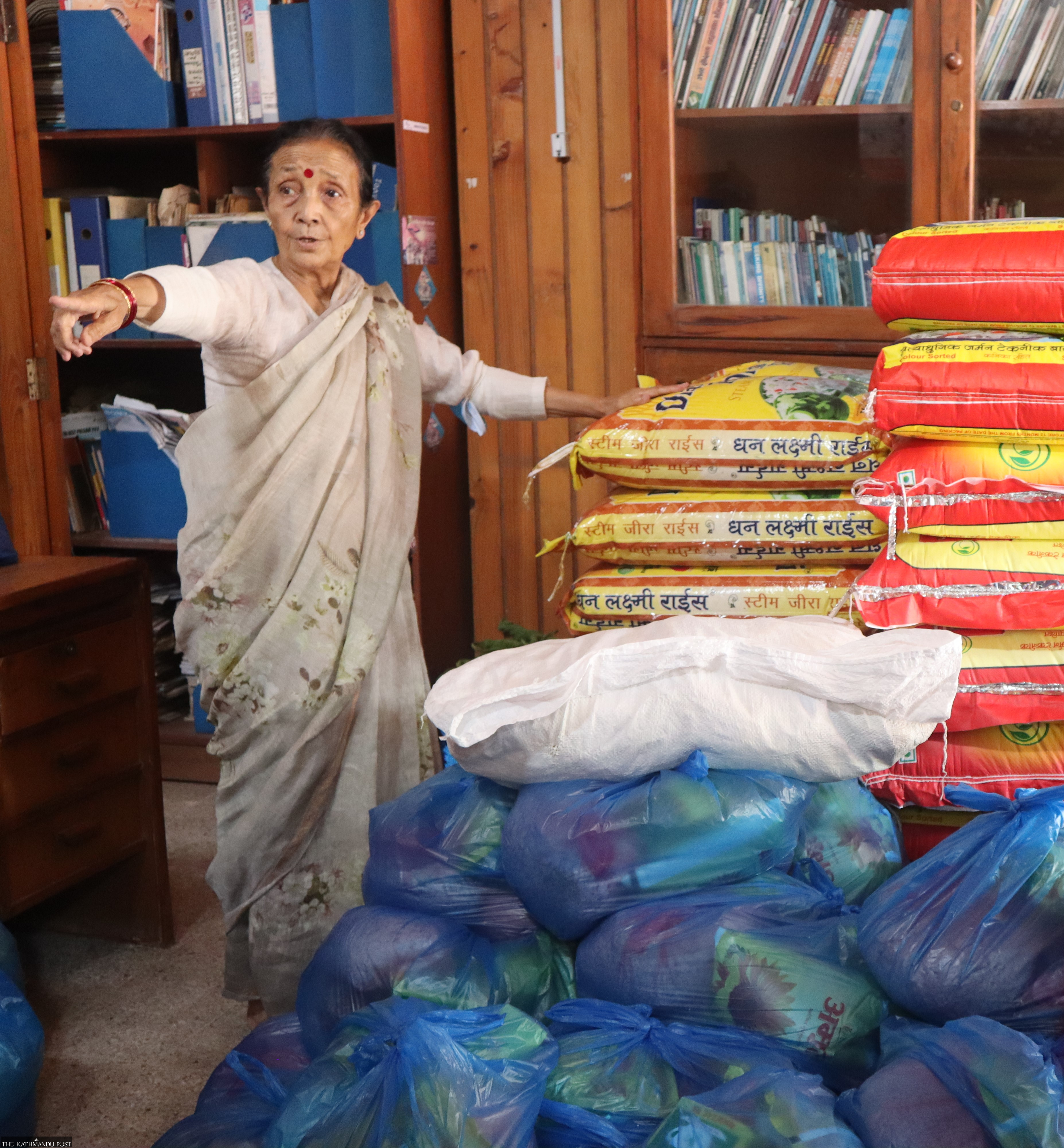Life & Style
The pandemic has disproportionately affected sex workers
Sex workers who want to quit the profession are now finding it more challenging to do so in the midst of a pandemic.
Tsering Ngodup Lama
As Sumitra (name changed) waited in the long queue in front of Maiti Nepal's office, she kept nervously fidgeting with her thumb. Now and then, she stepped away from the line and glanced at the front to see how quickly it was moving.
It was a humid and overcast July morning, and more than 80 women were already waiting in line. At 16, Sumitra was one of the youngest among them. The women had all come to get the food and cash aid being distributed by Anuradha Koirala, Maiti Nepal's founder. A few minutes past 11 am, Maiti Nepal's main gate partially opened, and one by one, the women entered.
Ever since the pandemic gripped the country last year, long queues of people waiting for food aid have become standard across the country. But what made the line in front of Maiti Nepal different from the others is that 80 percent of the women there were active sex workers, and the rest were former sex workers, with many having left the profession very recently.
Once inside the Maiti Nepal's compound, each woman was first given sanitisers and then directed to a desk where a staff noted their contact details. Another staff then handed each woman a cash aid of Rs 2,500, a sack of rice and a bag, including cooking oil, salt, sugar, tea, chickpeas, beaten rice, masks and a hygiene dignity pack, among other essentials.
From time to time, Anuradha Koirala came out of the gate to see if there were elderly women and women carrying infants waiting in line. If there were, she instructed them to head to the front.
According to Koirala, in the last year, she and her team have distributed food and cash aid to more than 3,500 active and former sex workers in the Valley and to over 100 in cities like Kakarbhitta, Itahari and Nepalgunj. The aid distribution, she adds, is her personal initiative and not funded by Maiti Nepal.
“It all started with a news report I read back in June last year. The article stated the pandemic had left many sex workers without work and that many of them were struggling to pay rent and put food on the table. As someone who has worked in this field for a very long time, the article made me aware of the challenges sex workers are facing due to the pandemic. I knew I had to do something,” says Koirala. “I began by asking my friends and well-wishers if they'd be interested in helping me provide aid to financially struggling sex workers. I am fortunate that many came forward, and in June last year, we distributed the first batch of food and cash aid.”
It was 1993 when Koirala established Maiti Nepal to protect girls and women from trafficking and other forms of abuse. And over the years, Koirala has become one of the leading voices against trafficking and the sex trade.
“I have for years spoken against this line of work because I have seen firsthand the dark side of this profession and its physical and psychological impact on sex workers,” says Koirala. “Despite the inherent challenges and risks of the profession, many of the women continue to do it because they do not have any other option. Knowing that the pandemic has posed so many challenges to them, I have to help them no matter how strongly I disagree with the profession.”
As women filed out of Maiti Nepal's office carrying sacks of rice and plastic bags, Sumitra keenly watched them.
“I hope I'll get the food and cash aid they are distributing here,” says Sumitra as she nears the gate. “I have been told that there's enough aid for all of us here. The aid will determine how I will get by in the next few months.”
Sumitra knows precisely for how many months the aid provided by Koirala is going to last her.
“The sack of rice is going to last me at least three months. The dal should last me around the same time, if not longer. The cash aid of Rs 2,500 will help me refill my near-empty cooking gas cylinder. With all this, for the next three months, I won't have to worry about not knowing where my next meal is going to come from,” she says.
In 2017, Sumitra left her village in Sindhupalchok and came to Kathmandu with the hopes of pursuing her higher studies. She was 12 at the time. For the first year, she went to school regularly and made do with whatever little money her father sent her to cover her expenses.
“Living in this city with minimal money wasn't easy,” she says. “I am the eldest child, and I have four younger siblings. My father, whom I love dearly, is the only breadwinner in the family, and I know it's extremely challenging for him to cover the family's expenses with his limited income.”
After a year of living off the money her father sent, Sumitra decided to search for work to ease the burden on her father. A friend got her job at a restaurant, where she waited on tables. After a while, the owner started sending clients her way, and soon she was sleeping with anywhere between four to five clients a day.
"I was getting paid Rs 10,000 a month and getting two meals a day," says Sumitra. "The money wasn't much, but it did allow me to pay my rent and cover my school fees and other expenses. The earnings gave me financial independence, which was what I desperately needed."
In March 2020, Nepal announced the first of its pandemic-induced lockdowns. Sumitra was left without work for the rest of the year.
"It wasn’t easy to be without work for the most of 2020. I thought this year would be better. In February, my employer asked me to rejoin work. Two months later, in April, the government announced another lockdown, and I have been without work since," says Sumitra.
When asked what she feels about her profession, Sumitra is quick to point out that she is not ashamed of what she does for a living.
"At that point in my life, I did what I had to do to survive. But if I had a choice back then, I wouldn't have gotten into this profession in the first place. It's a risky job. I have been with plenty of clients who were physically abusive and reckless with their safety and mine," says Sumitra. "If better opportunities come my way, I am ready to leave this profession."

As the aid distribution in Maiti Nepal continued, it became clear that one of Koirala's intentions with the distribution was to make aware of the help and support Maiti Nepal provides to those like Sumitra who want to leave sex work.
Midway into the distribution, Koirala, who is now 72, announced, to the surprise of many women waiting in the line, that she will be providing pushcarts and seed money of Rs 13,000 to 100 women who are willing to start a small business.
"We have also collaborated with several organisations to provide skill-based training to interested women. We are currently offering training for those interested in becoming excavator operators, beauticians, and safa tempo drivers. We will be adding a few other options soon," says Koirala.
One of the beneficiaries of the programme is 20-year-old Akriti (name changed), who is now training to become a beautician at one of Kathmandu's leading beauty salon chains. Akriti, the eldest of her three siblings, was only 12 when she lost her father, the family's sole breadwinner.
"My mother has been unwell for years, and she cannot work. After my father's death, it became my responsibility to look after the family," she says.
A year after her father's passing away, Akriti came to Kathmandu and started working as domestic help. "My employers never paid me on time," says Akriti.
At 16, with hopes of earning better money, she started working at a dance bar. "Even though the money I made as a dancer/sex worker was comparatively better than my previous job, the working environment wasn't safe at all. Some clients were very abusive and would refuse to pay me," says Akriti.
In 2020, as bars and restaurants closed due to the pandemic, Akriti lost her job.
"When businesses began opening towards the end of last year, my employers, citing lack of customers, refused to rehire me," she says. "That was when I decided to leave this profession for good."
But the journey so far has been anything but easy.
Despite looking for work for months, Akriti hasn't held a steady job since the pandemic hit. Desperate, she worked as a daily wage labourer at a construction site for two weeks. The experience made her realise that if she is to never return to sex work again, she'll have to acquire a marketable skill.
“When I met Anuradha dijju a little over a month ago and she told me that she would get me enrolled for free at a beautician training course, I was delighted,” she says. “In a few months, I'll be a trained beautician. I am very grateful to dijju for the opportunity.”
But both Akriti and Sumitra say they now realise that finding another job in a world gripped by a pandemic is anything but easy.
“Finding jobs during a pandemic is very difficult,” says Akriti. “The food aid I received from Anuradha dijju will last me and my siblings a few months. But I desperately need a job, as I haven’t paid my rent for five months. Me and my four siblings will face eviction if I don’t pay the rent soon.”
Sumitra, who is also planning to leave sex work, says she can relate with Akriti. "I want to quit sex work too, but given how bad the current situation is, I know getting jobs won’t be easy,” says Sumitra.
Both Sumitra and Akriti have approached Koirala to help them cover their rent expenses as they look for jobs.
“There are so many women who have come to me asking for help with their rent. A few of my friends have pooled in money to help pay rent for some of these women. But it's not monetarily possible to do it for all," says Koirala. "Keeping this in mind, I have already asked a few businesses to hire these women. The government should also make sure that the many women-oriented programmes they run are accessible to women from all backgrounds. Making matters more challenging, many of these women don't have citizenship, which bars them from accessing many opportunities.”
With a little over a week left for the month to end, Sumitra is already worried about the rent. "If I don't pay this month, it will be four months of back rent," says Sumitra. "I have been hesitating to get back to sex work, but if this continues, I'll have no option but to get back to it.”




 13.12°C Kathmandu
13.12°C Kathmandu










